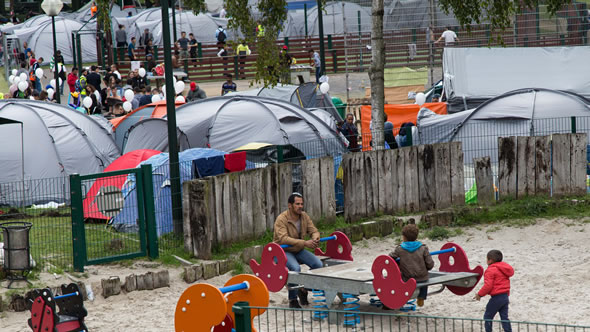Brussels – ESI discusses refugee crisis and its implications for the Western Balkans

ESI Senior Analyst Alexandra Stiglmayer participated in a roundtable discussion on the topic of "The current European refugee crisis and its implications for the Western Balkans". It was organised by the German Council of Foreign Relations (DGAP) and the Stiftung Wissenschaft und Politik (German Institute for International and Security Affairs - SWP). The presenters were Alexandra and Dusan Reljic, the head of the SWP Brussels office, and the participants included 12 analysts from Western Balkan think-tanks who participated in DGAP's Train programme.
Alexandra made the point that the main players in the current refugee crisis were Syria, the country of origin of millions of refugees who seek shelter in countries directly neighbouring the EU; Turkey, the country which currently hosts 2.2 million Syrian refugees and through which most refugees reach the EU; and Germany, the main destination country in the EU. She presented ESI's proposal how to reduce and better manage numbers of arriving refugees and at the same time save the UN's Refugee Convention. This convention commits its 145 signatory countries – including all EU member states - to offer asylum to people fleeing persecution and war, and it has been translated into EU law that is binding on EU member states.
ESI's proposal rests on two central pillars: Germany taking substantial numbers of Syrian refugees directly from Turkey (500,000 in the next 12 months) and Turkey fully implementing the readmission agreement with Greece, thus closing this migration route. In addition to sharing the refugee burden with Turkey, the EU should offer Turkey visa-free travel and financial support to improve conditions for refugees in Turkey, Alexandra said, adding that other EU member states should also take contingents of refugees directly from Turkey.
If migration continues in the same uncontrolled way as in 2015, she said, it will benefit right-wing, anti-EU parties, which are already making gains in many EU countries such as Austria and France. It could eventually lead to the end of the international commitment to provide shelter to refugees and seriously shake the EU and EU values. Sweden, a country proud of its open doors for refugees, she said, had been already forced to scale down benefits since it could not cope with the number of refugees seeking asylum in Sweden.
Alexandra said the Western Balkans played a subordinate, but still important role in the current refugee crisis. They were countries of transit and should implement the 17-point action plan that Western Balkan leaders agreed with the European Commission and EU member states. The most important issue was to offer shelter, food and medical care to the transiting refugees and build up reception facilities in case that one of the countries further north closed its border or reduced the number of refugees it allows to enter. In the longer term, however, she said, Croatia and the Western Balkan states should establish asylum systems in line with EU standards so that they too can offer high standards of asylum to refugees fleeing persecution and war.
